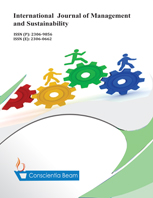The determinants of the financial inclusion of Indonesian female entrepreneurs
DOI:
https://doi.org/10.18488/11.v13i2.3651Abstract
This study intends to handle the latter gap: different results of the determinants of financial inclusion, i.e., financial literacy, age, income, and education. Furthermore, it applies the quantitative design, examining the statistical hypotheses. Additionally, the snowball sampling method chose the population of female entrepreneurs in Indonesia. Through the survey in 2022, this study effectively obtained one hundred and fifty-two samples and their responses. Furthermore, the logistic regression model and classification matrix analyze the obtained data. According to this study’s measurements of access, savings, and credit accounts (AA, SA, and CA), financial literacy effectively increases the financial inclusion of female entrepreneurs. At the same time, demographic features, i.e., age, income, and education, have a positive effect on these accounts. The classification accuracy of financial literacy towards AA, SA, and CA is 94.1%, 80.3%, and 95.4%, respectively. For age, the accuracy is 72.4% for AA, 81.6% for SA, and 67.1% for CA. For income, the accuracy is 89.5% for AA, 85.5% for SA, and 96.1% for CA. For education, the accuracy is 88.2% for AA, 78.3% for SA, and 94.7% for CA. Considering this evidence, businesswomen must have the financial knowledge to choose access, savings, and credit accounts to sustain and grow their business scope. For this purpose, central and local government support is still vital to assist them.

